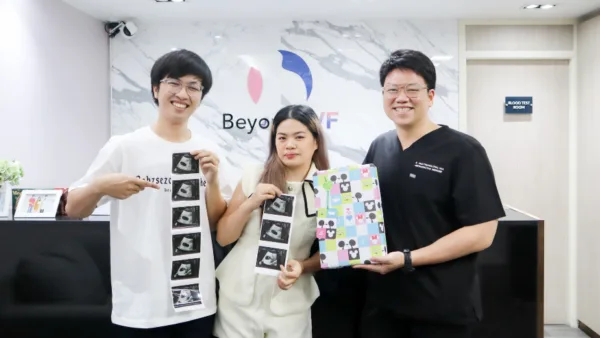Diagnosed with Uterine Fibroids but Successfully Conceived through ICSI with Dr. Ton at Beyond IVF
This patient had been trying to conceive naturally since the age of 30. However, after five years without success, she became increasingly concerned. By the time she turned 35, she was aware that continuing to try naturally could increase the risk of chromosomal abnormalities in her child. Due to this concern, she decided to seek medical treatment.
After researching various options, she discovered IVF treatment with NGS chromosomal screening. Encouraged by recommendations from infertility support groups and success stories from patients with similar cases at Beyond IVF with Dr. Ton Poonsak, she decided to schedule a consultation. The fact that Beyond IVF offers free consultations further helped her make this decision.
Diagnosis & Treatment Plan
During her consultation, the patient requested a full medical evaluation to determine the best course of action. She was worried that waiting any longer might make conception even more difficult and increase the risk of abnormalities in her future child.
Test results revealed uterine fibroids. Dr. Ton assessed that this could be a key factor preventing natural conception. However, he assured her that she could still proceed with ICSI (Intracytoplasmic Sperm Injection) without needing surgery. Since the fibroids were not located in a critical area of the uterus, pregnancy was still possible.
Additionally, her hormone levels (AMH, FSH, E2, P4, LH, PRL) were all normal, meaning that pregnancy was feasible with the right medical approach. To maximize the chances of success, Dr. Ton recommended NGS (Next-Generation Sequencing) chromosomal screening before embryo transfer. Given the patient's age, he did not advise transferring an embryo without first screening for chromosomal abnormalities. NGS provides 100% accuracy in detecting chromosomal abnormalities, improving implantation success and pregnancy outcomes.
The ICSI Process
Once her menstrual cycle started, the patient immediately began ovarian stimulation injections.
-
Egg retrieval: When the follicles reached the optimal size (18-20mm), 19 eggs were retrieved.
-
Fertilization: 10 embryos successfully developed to the blastocyst stage.
-
NGS screening: Only three embryos were chromosomally normal, but only one was of the highest quality for transfer.
Successful Embryo Transfer & Pregnancy
Fifteen days after the embryo transfer, her HCG hormone levels exceeded 1000 mIU/ml, confirming a strong likelihood of pregnancy. At her first ultrasound appointment, a gestational sac was detected, confirming successful implantation on the first transfer attempt.
Dr. Ton described this as a "fighter embryo" because it successfully implanted on the first try, despite the patient’s previous struggles.
Key Techniques Used at Beyond IVF
ICSI: A specialized microscopic technique that directly injects sperm into the egg, increasing fertilization rates.
NGS: Advanced chromosomal screening to ensure only genetically normal embryos are transferred.
Patient's Experience at Beyond IVF
"I am so happy that I chose to undergo treatment with Dr. Ton at Beyond IVF. My first attempt was successful, and the level of care and attention to detail was outstanding. The clinic is modern, not intimidating at all, and very convenient to visit. The staff was extremely helpful, and parking was available, making the entire experience stress-free."
This case highlights how a personalized treatment plan and cutting-edge reproductive technology can help women with complex conditions, such as uterine fibroids, achieve a successful pregnancy.


